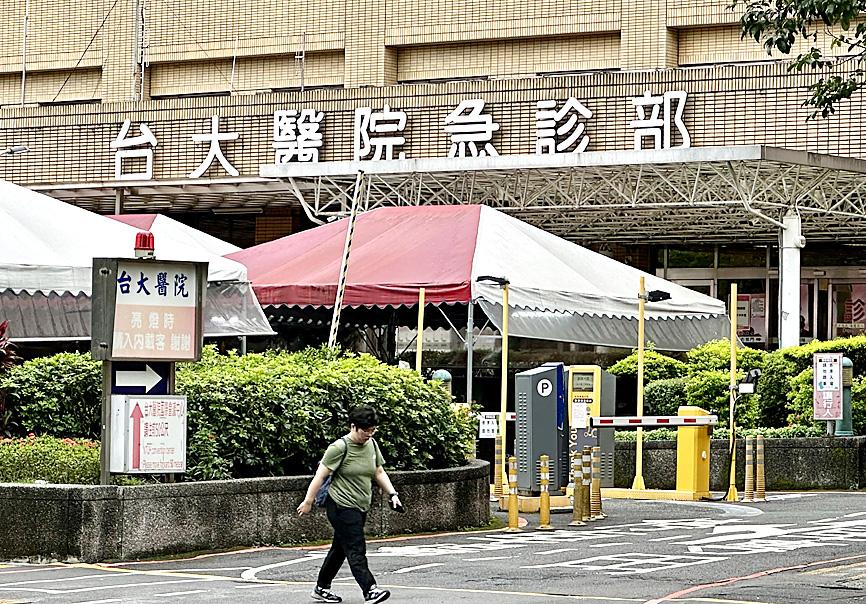Last year cancer was the leading cause of death in Taipei for the 51st consecutive year, while COVID-19 became the third most common cause of death in the city, the Taipei Department of Health said yesterday.
The department said 21,047 Taipei residents died last year, which is an increase of 2,395 people (12.8 percent) compared with the year before, while the mortality rate was 841 deaths per 100,000 people, which is 113.4 deaths (15.6 percent) more than the year before.
The growth rates of deaths and mortality were the highest on record.

Photo: Lo Pei-de, Taipei Times
They were mainly affected by the COVID-19 outbreak and aging population, it said.
Among the 10 leading causes of death in Taipei, cancer was followed by heart disease, COVID-19 infection, pneumonia, cerebrovascular disease, chronic lower respiratory disease, diabetes, hypertensive disease, kidney disease and vascular or unspecified dementia.
Deaths from the 10 leading causes accounted for 76.7 percent of all deaths in the city last year, and eight among the leading causes were chronic diseases, accounting for 62.4 percent of all the deaths in the city, it said.
The number of deaths due to cancer, pneumonia and cerebrovascular disease have slightly decreased last year, while deaths due to the other seven causes increased, and among them, COVID-19-related deaths increased by 1,287 people, which is 3.8 times of that from the year before, the department’s data show.
About 82.9 percent of the total deaths were of elderly people aged 65 or older, and of the COVID-19 related deaths, 90.2 percent were aged 65 or older.
The Taipei Department of Health’s Statistics Office Director Fan Ju-hsin (范汝欣) said that COVID-19 leaped from the 11th leading cause of death to the third leading cause of death last year, and that the city’s COVID-19 mortality rate was 65.1 deaths per 100,000 people, slightly higher than the nation’s COVID-19 mortality of 62.9 deaths per 100,000 people.
The high COVID-19 mortality rate could be explained by Taipei’s higher number of elderly residents — the second highest percentage of elderly in its population in the nation, she said, adding that the data also did not distinguish between the influence levels of different factors, such as those who died of COVID-19 and might also have had cancer, but were counted among the COVID-19-related deaths.
In other news, the Centers for Disease Control (CDC) yesterday denied Taiwan People’s Party (TPP) Chairman Ko Wen-je’s (柯文哲) claim on Sunday about the government having received more donated COVID-19 vaccines than it purchased.
The CDC said Taiwan began purchasing COVID-19 vaccines in September 2020, and received vaccines donated by Taiwan Semiconductor Manufacturing Co (台積電), Hon Hai Precision Industry Co-affiliated Yonglin Foundation, the Buddhist Compassion Relief Tzu Chi Foundation, as well as the governments of the US, Japan, Lithuania, the Czech Republic, Poland and Slovakia.
As of the end of last month, Taiwan had received a total of 92.675 million doses of vaccines — 68.41 million doses purchased by the government and 24.265 million doses donated by the countries and agencies — it said, adding that the government had purchased 73.8 percent of the vaccine doses.
Additional reporting by CNA

Taiwan has received more than US$70 million in royalties as of the end of last year from developing the F-16V jet as countries worldwide purchase or upgrade to this popular model, government and military officials said on Saturday. Taiwan funded the development of the F-16V jet and ended up the sole investor as other countries withdrew from the program. Now the F-16V is increasingly popular and countries must pay Taiwan a percentage in royalties when they purchase new F-16V aircraft or upgrade older F-16 models. The next five years are expected to be the peak for these royalties, with Taiwan potentially earning

STAY IN YOUR LANE: As the US and Israel attack Iran, the ministry has warned China not to overstep by including Taiwanese citizens in its evacuation orders The Ministry of Foreign Affairs (MOFA) yesterday rebuked a statement by China’s embassy in Israel that it would evacuate Taiwanese holders of Chinese travel documents from Israel amid the latter’s escalating conflict with Iran. Tensions have risen across the Middle East in the wake of US and Israeli airstrikes on Iran beginning Saturday. China subsequently issued an evacuation notice for its citizens. In a news release, the Chinese embassy in Israel said holders of “Taiwan compatriot permits (台胞證)” issued to Taiwanese nationals by Chinese authorities for travel to China — could register for evacuation to Egypt. In Taipei, the ministry yesterday said Taiwan

Taiwan is awaiting official notification from the US regarding the status of the Agreement on Reciprocal Trade (ART) after the US Supreme Court ruled US President Donald Trump's global tariffs unconstitutional. Speaking to reporters before a legislative hearing today, Premier Cho Jung-tai (卓榮泰) said that Taiwan's negotiation team remains focused on ensuring that the bilateral trade deal remains intact despite the legal challenge to Trump's tariff policy. "The US has pledged to notify its trade partners once the subsequent administrative and legal processes are finalized, and that certainly includes Taiwan," Cho said when asked about opposition parties’ doubts that the ART was

If China chose to invade Taiwan tomorrow, it would only have to sever three undersea fiber-optic cable clusters to cause a data blackout, Jason Hsu (許毓仁), a senior fellow at the Hudson Institute and former Chinese Nationalist Party (KMT) legislator, told a US security panel yesterday. In a Taiwan contingency, cable disruption would be one of the earliest preinvasion actions and the signal that escalation had begun, he said, adding that Taiwan’s current cable repair capabilities are insufficient. The US-China Economic and Security Review Commission (USCC) yesterday held a hearing on US-China Competition Under the Sea, with Hsu speaking on